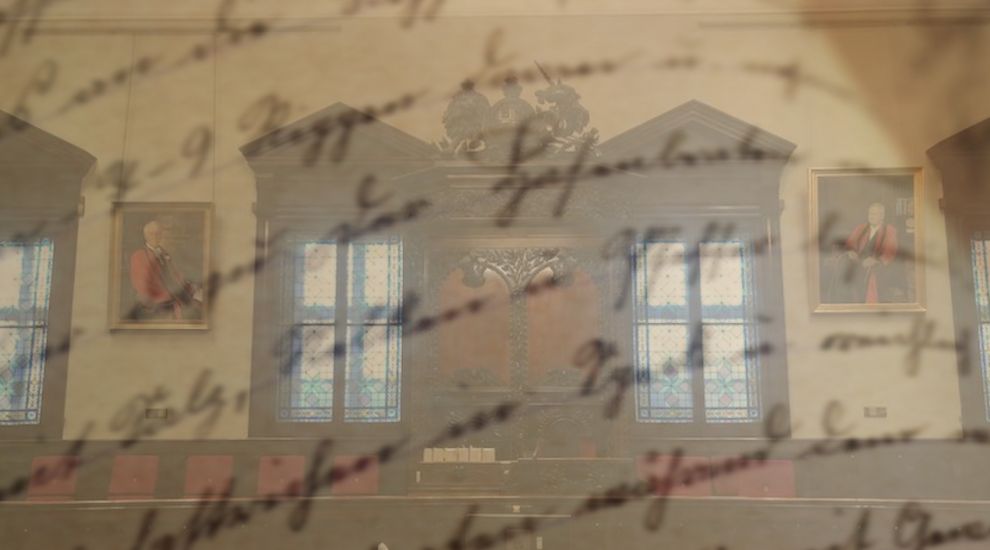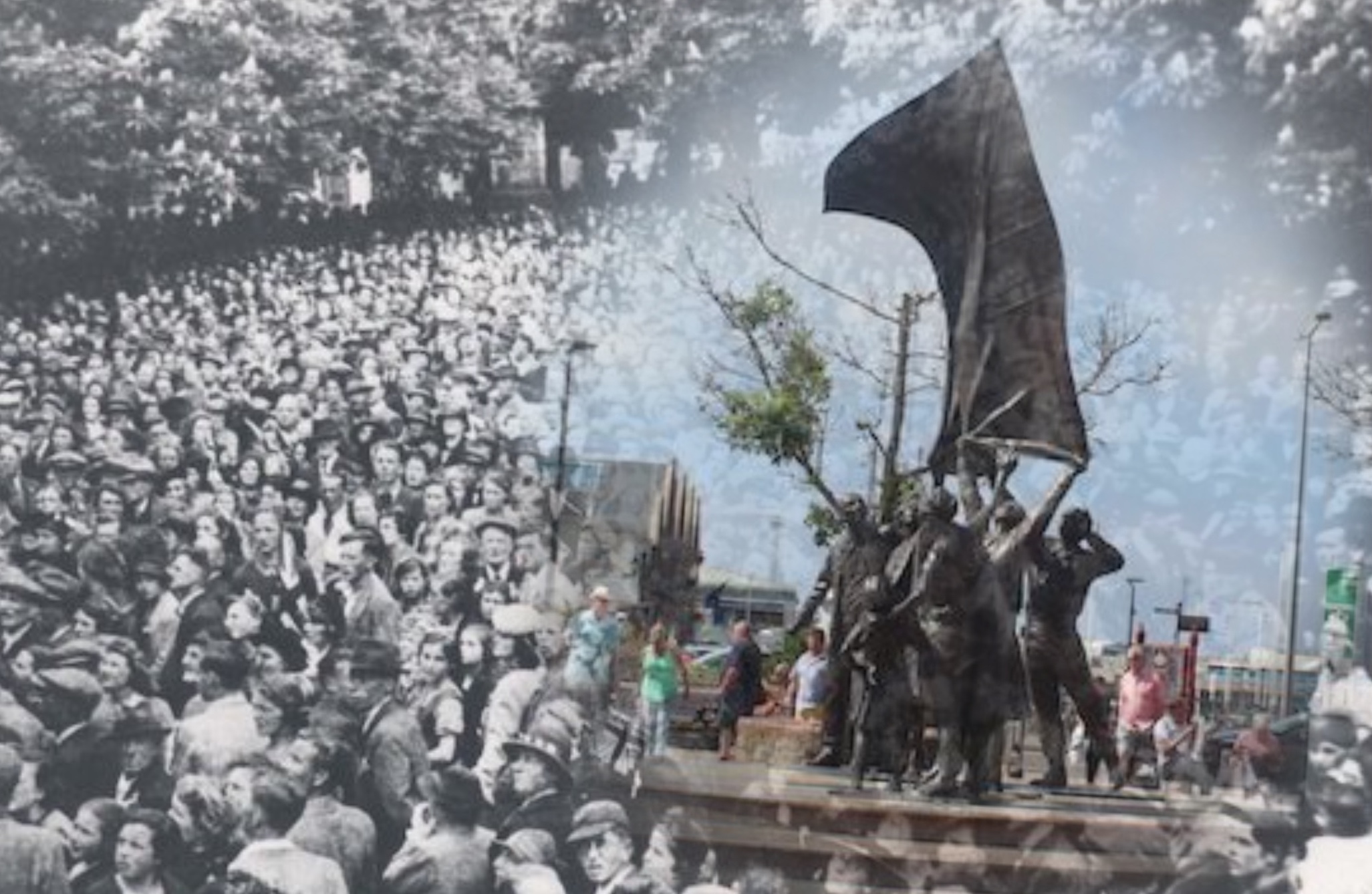


Doomed romances, royal encounters and snide salutes...a release of thousands of the Bailiff’s papers have unveiled a whole raft of unique insights and stories of the Occupation.
The entire collection of the Bailiff’s Occupation and Liberation files has been digitised, with over 3,000 files and nearly 40,000 pages now on Jersey Heritage’s Archives and Collections Online catalogue.
The project, funded by the Association of Jersey Charities and Channel Islands Lottery, with the support of the Bailiff’s Chambers, resurrects files of administration recorded during the Occupation, giving a window into the role of then-Bailiff, Sir Alexander Coutanche, and life under German rule.
“The project has enabled us to ensure the long-term preservation of the originals of one of Jersey’s most valuable archive collections, while making the documents available online to Islanders and a worldwide audience and enhancing the story of Jersey’s unique occupation history," Michele Leerson, Jersey Heritage’s Online Development Manager, explained.
“The collection had been earmarked for preservation and digitisation for some time and we were delighted to receive the funding from the Association of Jersey Charities to enable this to go ahead, particularly in 2020, which marked the 75th anniversary of the Liberation of our island.”

Pictured: The files cover both the Occupation, the Liberation and the aftermath.
Liz Le Poidevin, Deputy Chair of the Association of Jersey Charities, said: “The AJC has awarded a number of Channel Islands Lottery grants to Jersey Heritage over the years for projects large and small.
“This request had particular resonance with the 75th anniversary of Liberation approaching and the grants panel recognised the importance of digitising the collection in order to preserve the original documents and make them accessible both locally and internationally.
“It was clear that the project required a dedicated resource and we were pleased that Jersey Heritage planned to undertake the work locally, under the supervision of Archive staff.
“We are delighted that our funding enables the Archive to offer free access to the collection for the next fortnight and encourage anyone with an interest in local history to take advantage of that opportunity.”
Pictured: All 3,000 files and 40,000 pages were digitised through the work of Jersey Heritage at the Jersey Archive.
Debbie Reynolds, Digitisation Officer at Jersey Heritage, said: “It has been an absolute privilege to have worked on such an important project, bringing these documents online for everyone to read.
“I was struck by the vast array of subjects, but mostly the personal stories of people writing to the Bailiff asking for help when other avenues had been in vain.”
Below, you can read some stories picked out from the countless files, where between the administration of daily life, rich tales of islanders lie...
A particularly striking story from the collection is a tale of tragic romance between a German soldier and a young Jersey woman.
Alice Thaureux (20) had been condemned to death by Military Court Martial, after she harboured and had a relationship with 23-year-old German soldier, Nickolaus Schmitz, who had deserted the German Army.

Pictured: A romance between a deserting German soldier and a Jersey woman ended in tragedy.
They were both imprisoned in the German military prison following their capture, and Nikolaus was court martialled and executed by the Firing Squad at Parade Ground at Fort Regent on 27 April 1945 for desertion.
However, in a letter dated 25 April 1945, the Bailiff pleaded that Alice be spared.
“Alice Thaureux was, it would appear, passionately in love with this soldier,” the Bailiff wrote.
“A young woman in love does not always weigh the consequences of her acts, when they are dictated by what she believes, however wrongly, to be for the welfare of her lover.
“I do not believe that Alice Thaureux is connected with any political party or that she is inspired by any political motives in the acts which she has done. I appeal for mercy.”
The Bailiff’s plea was successful, and Alice was sentenced to 10 years’ imprisonment instead of death.
Following the Occupation, the Bailiff had a number of brushes with royalty, including a message from King George VI to the people of Jersey, writing how “our thoughts have often been with you in your years of trial and the Queen and I are deeply moved by your heartfelt expression of welcome.”

Pictured: The Royal visit led to a Prison Chaplain urging the Bailiff to give prisoners amnesty.
On the topic of the royal visit, a request from Prison Chaplain Reverend Herbert William Quarrie showed a compassion and sympathy for prisoners, asking for an amnesty for prisoners incarcerated during the Occupation in honour of the visit.
“My touch with the prisoners is close and personal and I can vouch for the fact that many of them are not criminally minded,” the Chaplain outlined in the message.
However, the Bailiff told him in response that though he had initiated steps towards this goal, he was not in control of the outcome.
The new papers also provide an insight into the small acts of rebellion keeping islanders going through the period.
In one order dated September 9 1940, given by the Colonel Schumacher of the occupying forces, all Policemen in uniform and Auxillary Police should show honour to German Officers and Military Officials by saluting them.

Pictured: Islanders' salutes at German officers were so half-hearted they were told to stop altogether.
Despite this order, a paper detailed how on the 9 November, Colonel Schumacher had to inform the Bailiff that “the salute which the Police and traffic controlmen give to officers of the German Army lately leaves much to be desired.
“The salute is either not given at all or else given in a form which cannot be interpreted as a gesture of regard but rather as the opposite.”
Comments
Comments on this story express the views of the commentator only, not Bailiwick Publishing. We are unable to guarantee the accuracy of any of those comments.